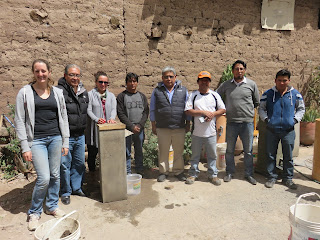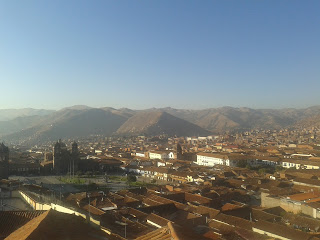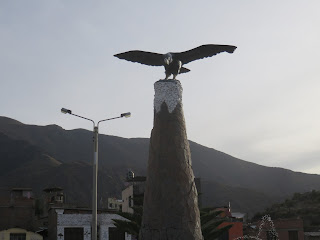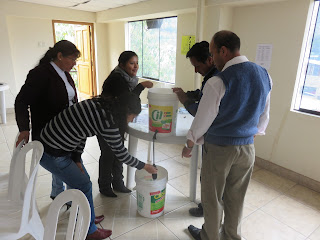This week I had two opportunities to find out about different types of water filters.
A
visiting group from the USA brought 5 Sawyer filters with them and can
provide more if we think it's a good idea - so we hosted a workshop to
try them out.
 |
| "To clean the filter, you force water through it THIS way..." |
All the groups enjoyed assembling the puzzle. It's pretty simple and quick - the hardest part it drilling the hole through the plastic bucket by hand, but the whole assembly took about 10 minutes.
I need to think about how the filtered water can be stored so that it stays clean!
To show visually how good the filter is, we dumped in a load of mud...
...and people were willing to drink the clear water that came out (the science says that invisible pathogens are also filtered out!)
Generally
feedback was very positive because the filter is so small and light and
easy and quick to install... some reservations about proper use and
cleaning though!
 |
| Feedback time (I did a lot of listening as well as talking) |
I invited all the AIDIA staff as well as a big group from the local
government water office - timing didn't quite work out as the government
guys arrived just as we were finishing, so it turned into 2 workshops! Here's the second round...
Then at the weekend I went on a training course (organised by CAWST,
whose community teaching materials I've been using for years, so I was
excited to go and find out more about them) learning how to build
Biosand filters and how they work in practice.
 |
| "rock paper scissors with a twist... the Pathogen destroys the Baby, the Baby, destroys the Filter (by blocking the pipe with a pebble, for example), and the Filter destroys the Pathogen. |
It was great to take part in a practical course with other
people who work in the type of programme that I want to build. It was
fun that so much of it was hands-on, but also good to go through lots of
information about household-level water treatment (as opposed to
community-level which is what most systems are in Apurímac) so that I
can now consider both types of filters and compare them to the needs and
the culture.
 |
| Sieving sand and gravel - we did lots of this when I worked in Ecuador so I felt right at home. |
 |
| We built 2 concrete filter casings... |
 |
| ...and learned about the PVC option the NGO "Desea PERU" had developed. |
Then it was time to clean all the sand and gravel that we had previously sieved... but not too much!
 |
| Explaining just how clean the sand should be! |
 |
| It took a LOT of water. |
And here's our finished product... clearly there wasn't time for the whole curing of the concrete but the result was visibly clean water and the correct flowrate - and certainly more memorable than diagrams and calculations.
 |
| The class... I really need to learn to stand at the back in photos. Here's my trademark slouch. |
The course was in Pisac so this meant four days in the Sacred Valley, near Cusco - such a hardship!
 |
| I stayed at this hotel in Cusco for the first time 15 years ago... and here's why I keep going back. |
Near Pisac - the valley where the training was.
On the final day we finished at lunchtime, so I got to visit the beautiful Archaeological Park of Pisac, and enjoy some walking.






































































